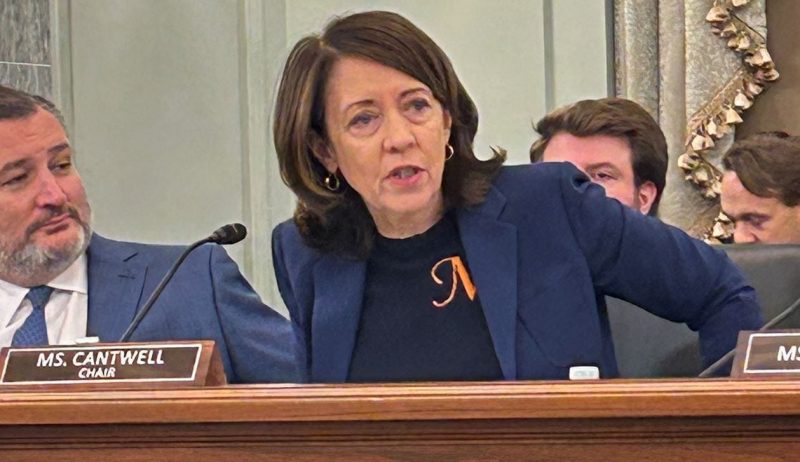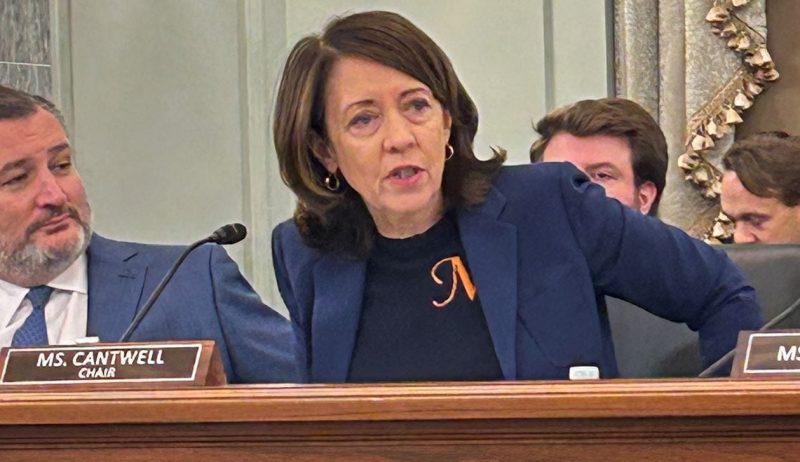
The next domino in college athletes’ rights and Name, Image and Likeness legislation tipped Monday night.
U.S. Sens. Maria Cantwell (D-Wash.), Cory Booker (D-N.J.), and Richard Blumenthal (D-Conn.) introduced the Student Athlete Fairness and Enforcement (SAFE) Act, aiming ‘to codify athletes’ rights and protections in law, expand revenue for all schools, support women’s and Olympic sports and bring much-needed stability to the college sports system.’
The key provisions in the bill provide federal NIL protections, pooling of media rights, new broadcast revenue for Olympic and women’s sports, local market broadcast access for football and basketball, protections from bad actor agents, national standards for the transfer portal and preserves the House vs. NCAA settlement’s 22% revenue share cap.
‘This legislation is a path through the new world of NIL,’ Cantwell said in a statement. ‘This bill will protect athlete rights, preserve women’s and Olympic sports and help smaller schools compete. It is a fair shake for everyone, instead of the biggest, richest schools.’
Cantwell released a report in August showing how the SEC and Big Ten have severely outpaced the remaining conferences in financial firepower, primarily with their lucrative media rights payments.
The bill proposes amending the Sports Broadcasting Act of 1961 to allow schools to negotiate media rights as a group to increase value without violating antitrust laws. It states schools must use increased media rights revenues to keep the same number of scholarships and roster sports for non-revenue generating and women’s sports as provided during 2023-24 academic year.
And it says football and basketball games must be provided to local markets on a local broadcast outlet and not behind a paywall.
‘Those closest to college sports — including student-athletes and leaders of America’s colleges and universities at all levels — have consistently called on Congress to take action and address the actual threats facing college athletics,’ NCAA senior vice president for external affairs Tim Buckley said in a statement. ‘This includes protecting student-athletes from being forced to become employees, and ensuring academic standards and other commonsense rules can be applied consistently. There has never been more momentum in Congress to address these challenges and the NCAA will continue to work with all lawmakers to maximize opportunities for America’s 500,000-plus student-athletes.’
Among its provisions, if passed through Congress the SAFE Act would:
- Provide federal NIL rights, replacing patchwork state-by-state laws.
- Establish health and safety standards for heat exertion, brain injury, asthma; provide five years of post-eligibility medical coverage for sports-related injuries.
- Protect scholarships, a 10-year guarantee.
- Provide NIL contracts that outline what athletes must do under the contract and how much they’ll be paid.
- Require agents cap their fees at 5% and to register with a state.
- Allow students to transfer twice without having to sit out for a year; students can transfer without having to sit out for a year if their sport is cut or reduced.
This legislation is in response to the House introducing the Student Compensation and Opportunity through Rights and Endorsements (SCORE) Act. Cantwell, the top Democrat on the U.S. Senate Commerce Committee, on Aug. 25 sent a letter to NCAA Division I school chief executive officers and governing boards to “express my deep concerns” about a Republican-authored college-sports bill that has passed two House of Representatives committees.
The SCORE Act, the bill would establish a variety of national rules concerning how college sports operate. It includes antitrust-exemption language that specifically would allow the NCAA, and potentially the new College Sports Commission, to make operational rules affecting schools and athletes in areas that have come into legal dispute in recent years. That would include rules about transfers and the number of seasons for which athletes can compete.
Cantwell specifically claimed the bill’s language would allow the NCAA to alter the House settlement’s basic metric for determining the amount of money athletes would be able to receive in so-called revenue-sharing payments from schools so that it could increase from the 22% of certain revenues of the association’s power-conference schools.
‘In stark contrast to harmful legislation being considered in the House, our bill preserves athletes’ rights to advocate for themselves and ensures meaningful avenues for accountability,’ said Booker, who played football at Stanford. ‘Playing college football was one of the great gifts of my life – and it instilled in me a lasting conviction to fight for justice and fairness for athletes today and into the future.’
(This story was updated to add new information.)

